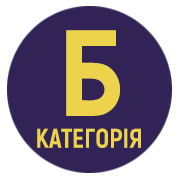THE USE OF GAME TECHNOLOGIES IN FOREIGN LANGUAGE CLASSES TO IMPROVE THE FOREIGN LANGUAGE LEXICAL COMPETENCE OF THE STUDENTS MAJORING IN PHILOLOGY
DOI:
https://doi.org/10.32782/ped-uzhnu/2024-5-8Keywords:
innovative technologies, game technologies, educational process, educational game, global network, lexical unit.Abstract
The article is devoted to the study of the use of game technologies in foreign language classes to improve the foreign language lexical competence of students majoring in philology. The purpose of the article is to investigate the potential of game technologies as a means of improving the foreign language lexical competence of students majoring in philology and to determine their main structural elements. It has been established that the process of forming foreign language lexical competence begins with the acquisition of new lexical knowledge and continues through the development of the skills of using the learned vocabulary in the context. It has been determined that the educational game in the system of foreign language training is a structured activity that involves the achievement of the set initial goals, has a clear structure, defined stages, and a predictable result. The main elements of educational games in the educational process have been highlighted, namely: a goal (each game should have a clear and precise educational goal that corresponds to the goals that the player intends to achieve at the end of the game); rules (every game should contain a demanding element, namely a set of rules that explain to players how to play); a competition (competition plays a crucial role in determining the success of the activity); a task (the game should have an appropriate level of complexity that maximally exhausts the player's capabilities); an imagination (the game stimulates the creative abilities of students, which, in turn, strengthens their internal drive and desire to learn); entertainment ( the game should contain a noticeable aspect of enjoyment and pleasure). The advantages of using games in teaching a foreign language have been analyzed. They include the development of student interaction (in the game process, interpersonal communication skills and the ability to solve a given task are developed); improving the quality of language learning (during the game, students are actively involved in actions and accordingly learn new lexical items better, because only if they formulate a clear statement is it possible to win the game); and improving students' academic performance (it is implemented due to the use of various types of games that involve the development of listening, speaking, reading, and writing skills).
References
Вишневський О. І. Методика навчання іноземних мов: навч. посіб. 2-ге вид., переробл. та допов. Київ: Знання, 2011. 206 с.
Волох С. В. Використання ігрових технологій на практичних заняттях з англійської мови у закладах вищої освіти. Актуальні питання іноземної філології. 2020. №12. С. 33–41.
Загальноєвропейські Рекомендації з мовної освіти: вивчення, викладання, оцінювання. Наук. редактор українського видання доктор пед. наук, проф. С.Ю. Ніколаєва. Київ : Ленвіт, 2003. 273 с.
Коваль Т. І. Інтерактивні технології навчання іноземних мов у вищих навчальних закладах. Інформаційні технології і засоби навчання. 2011. №6 (26). 291 с.
Кукса Б. Актуальність проблеми взаємопов‘язаного навчання монологічного мовлення і письма з використанням мультимедійних засобів майбутніх учителів англійської мови. Науковi записки Сер.: Філологічні науки. 2015. Вип. 89. С. 301–303.
Смоліна С. В. Методика формування іншомовної лексичної компетенції. Іноземні мови. 2010. № 4. С. 16–23.
Чернищук Ю. І. Використання ігрових технологій при вивченні іноземних мов як інструмент компетентнісно-орієнтовного навчання у ВНЗ. Інноваційна педагогіка. 2022. Випю 44. Т. 2. С. 47–50.
Шмідт В. В. Етапи формування іншомовної лексичної компетенції студентів немовних спеціальностей. Наукові праці. 2009. Вип. 95. Т. 108. С. 141–145.
Alemi M. Educational games as a vehicle to teaching vocabulary. The Modern Journal of Applied Linguistics. 2010. Vol. 2 (6). Pp. 425–438.
Beavis C. Video games in the classroom. Developing digital literacies. Practically Primary. 2012. № 17 (1). Рр. 61–63.
Hladonik G. V. Video Games as Language Learning Tools. Інноваційна педагогіка. 2021. Вип. 33. Т. 2. С. 139–145.
Iten N., Petko D. Learning with serious games: Is fun playing the game a predictor of learning success. British Journal of Educational Technology. 2013. Vol. 47 (1). Pp. 98–113.
Lukianenko V. The Advantages of Using Games in Foreign Language Teaching and Learning. URL: http://interconf.fl.kpi.ua/node/1271 (дата звернення: 22.09.2024).
Nguyen V. D., Nguyen T. N., Bui N. B. Using Educational Games in Teaching English as a Foreign Language. International Journal of English Language Studies. 2024. № 6 (2). Рр. 105–110.






